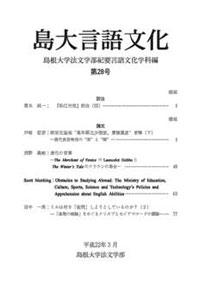ダウンロード数 : ? 件
この文献の参照には次のURLをご利用ください : https://ir.lib.shimane-u.ac.jp/3163
島大言語文化 : 島根大学法文学部紀要. 言語文化学科編 7
1999-07-25 発行
The Bilingualism of Isaac Taishi Carlton : A Status Report at Three Years of Age
Carlton Michael Wade
英語コミュニケーション研究室
ファイル
内容記述(抄録等)
The study of bilingualism is relatively new and bilingualism itself is rather difficult to define, therefore even prominent researchers have been unable to pin down the fundamental aspects of it. I don't expect to shed any real light in this paper; I simply hope to explain my thoughts on the subject in the context of how my son Taishi's bilingualism has progressed. Topics such as functional bilingualism, childrearing strategies, differentiated pronunc.iation, and the ever popular code-switching will be discussed. The reader should be warned that it is a Herculean task for any parent to describe their child's abilities objectively; I have done my best to paint the most accurate picture possible concerning Taishi's present state of bilingualism, or lack of it depending on your definition. Fantini has said that bilingualism is a matter of attitude more than proficiency. I tend to go along with that; thus my strategy, as it were=, has been to maintain a sense of naturalness regarding Taishi's learning two languages. In this paper, I will try to explain my rationale and offer reasons I have not chosen other strategies.
For every bilingual child, there are parents with different ideas about how to raise their children bilingually. Certainly, no method is correct for all situations; I don't want to give the impression that my way is the best way for everyone. But, we have been happy with it.
For every bilingual child, there are parents with different ideas about how to raise their children bilingually. Certainly, no method is correct for all situations; I don't want to give the impression that my way is the best way for everyone. But, we have been happy with it.
About This Article
ISSN:1342-3533

Other Article
